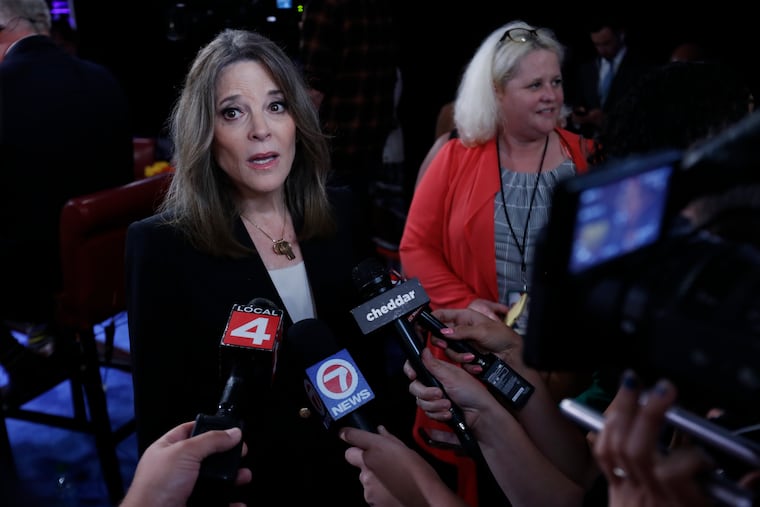How did Marianne Williamson get woke on reparations?
Williamson has been talking about reparations since 1997 and recently began discussions with American Descendants of Slavery.

News outlets were abuzz Wednesday morning about how Democratic presidential candidate Marianne Williamson declared in Tuesday night’s debate that reparations were “a debt owed” to African Americans for the legacy of slavery and 100 years more of Jim Crow and domestic terrorism.
“Marianne Williamson gave the clearest — and best — answer on why the U.S. should pay reparations,” read the headline on Slate.com.
Although reparations have been a topic since the end of the Civil War among African American activists — and came up among the Democratic candidates in February — Williamson employed unusual language for a political candidate. She said:
“First of all, it’s not $500 billion in ‘financial assistance.’ It’s $500 billion — $200 to $500 billion — payment of a debt that is owed. That is what reparations is.”
So how did Williamson, a spiritual adviser and self-help author, get so woke on reparations? She’s actually been discussing it for 20 years.
For the last two years, a fairly new organization called American Descendants of Slavery (ADOS), has argued that black Americans whose ancestors were enslaved are in dire financial situations because of the racial wealth gap, and that reparations is one way to address the injustice. Because Williamson wrote a 1997 book, Healing the Soul of America: Reclaiming Our Voices as Spiritual Citizens — which discusses reparations as a way to heal racism, “a national character defect” — the group reached out to Williamson in February to talk on co-founder Antonio Moore’s Tonetalks show on Dash Radio and YouTube.
“We talked extensively prior to and after my show in person," Moore said. “And we have exchanged a few emails.”
On the show, Williamson said every time she brings up reparations on the campaign trail, even in majority-white states like New Hampshire and Iowa, she gets applause.
She said most Americans haven’t been taught the history of America. “When you look at what happened in the 100 years between the end of slavery and the civil rights legislation," she said on the show, "I think the average American does not know the whole arc of our history.”
When talking to voters about the black code laws, the 40 acres and a mule promised to freed slaves, the Ku Klux Klan, segregation, "and that it took 100 years for this to be addressed, that this was another period of violence, people looked at me like no one had presented it for them in the way they might have,” Williamson said.
Her interaction with ADOS led to her introduction to Duke University economics professor William “Sandy” Darity, who has been studying reparations for 30 years. Darity and another economist were profiled in a July Wall Street Journal story on how their work has fueled recent activism on reparations.
Moore said Williamson is the only Democratic presidential candidate among the nominees he contacted who has agreed to come to the ADOS conference in Louisville, Ky., in October. ADOS, which believes reparations are owed solely to descendants of those enslaved in the United States, not to all those of African descent in this country, has been accused by many black people in more established organizations as being anti-immigrant.
The group and Williamson aren’t exactly on the same page. Moore said Wednesday that while he is glad she discussed reparations, he and Darity disagree with her estimate of what is owed. “It should be in the trillions,” Moore said.